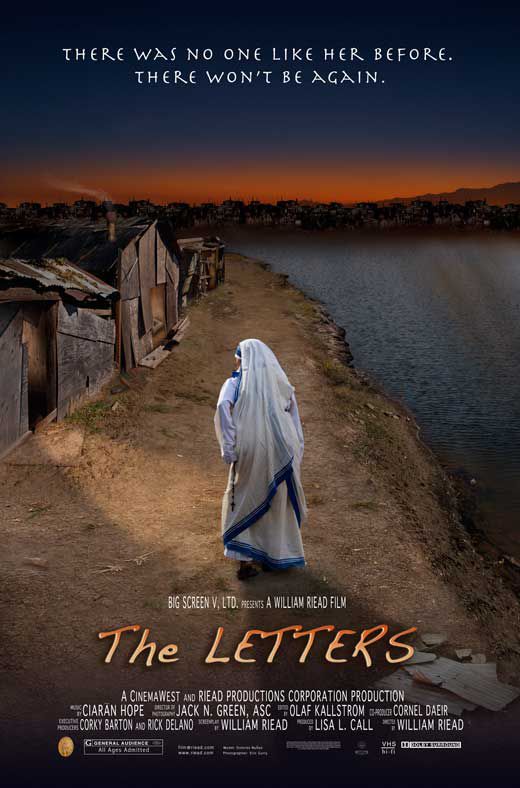In his prior career as a newsman for CBS, William Riead had an unusual knack for finding himself smack in the middle of historic moments. For instance, he was covering President Gerald Ford when Ford had not one, but two assassination attempts made on his life in the space of three days.
Riead eventually applied that innate sense of drama to his current career as a filmmaker, and the results have paid off with the recent Dec. 4 release of “The Letters,” the first major film biography about Blessed Mother Teresa. The new movie coincides with the Vatican’s recent announcement that Pope Francis has approved a miracle attributed to her intercession, paving the way for her canonization in 2016.
“The Letters” takes an unusual approach to the legendary nun’s life and mission working for the poor on the streets of Calcutta, India, by featuring a team of Roman Catholic priests and church officials examining hundreds of letters she sent to others throughout decades of her life that detailed her spiritual struggles with her vital work.
“I first wrote a cradle-to-grave biopic on Mother Teresa’s life. It was a nice story that would be very interesting to the Catholic and faith based audience, but maybe not the mainstream,” says Riead. “I heard about three to four trunk-loads of letters that a priest friend had collected from what she wrote to him about her true feelings about her work and what she’s experiencing. And then I thought to tell the story through her own words and document exactly what she went through.”
Riead has been a lifelong devout Catholic, noting his deceased mother “never missed Mass” and his late brother was a deacon in the church. He graduated from Western Illinois University with a degree in communications before starting his career as a TV reporter for an Illnois NBC affiliate, before beginning a fast-rising six-year career with CBS News and TVN, the precursor to CNN.
But after experiencing the stress of seeing high-pressure news — such as the Ford assassination attempts — take place right before his eyes, Riead opted to break out of journalism and form his own video production company in 1975. He specialized in both corporate videos and making special behind-the-scenes short films about the making of nearly 50 hit movies, including “Close Encounters of the Third Kind” and “The Goodbye Girl.”
He also directed a couple of low-budget action feature films along the way, but after seeing the evils of the terror attacks on 9/11, Riead was determined to do something more meaningful.
“A priest friend of mine asked if I knew about duality — for left there’s right, for right there’s wrong, for good there’s evil,” says Riead. “It occurred to me that there’s absolute evil in 9/11 and Paris, and I couldn’t believe that level of evil. But what’s the polar opposite? Good. Who represents good? Mother Teresa.
“I was in a meeting at Orion Pictures years ago and met director Richard Attenborough and he told me about this picture he’d just finished,‘Gandhi,’” continues Riead. “I saw it and told my wife, ‘He’ll activate change in the world through this movie.’ I told her before I retired I’d want to make change through a great movie too, and that’s how it all started.”
The process from there was an arduous one, but Riead’s efforts paid off with an impressive cast. He landed acclaimed British actress Juliet Stevenson (“Downton Abbey”) to play Mother Teresa, and signed two-time Oscar nominee Max von Sydow to play her spiritual director, the person to whom she wrote the letters. Rounding out the cast is veteran star Rutger Hauer, who plays the Vatican official responsible for advocating Mother Teresa’s chances for sainthood.
The movie was shot in both England and India, and to prepare Riead spent eight months on researching the famed nun’s life by reading 17 books in addition to countless magazines and newspaper articles about her. He enlisted more than 1,000 extras and hundreds of crew members for the project, which spent nine weeks filming in India, in addition to two weeks in London.
“My goal was to bring total authenticity to this movie and retrace her steps,” says Riead. “I didn’t want anything about the film to be fake. The facts and locations were accurate, and for anyone who knew about Mother Teresa, my goal was to have them approach me after a screening and say, ‘You nailed it.’ And I think I did.”
When Stevenson accepted the role as Mother Teresa, she asked Riead what he expected of her. He replied that he hoped she could bring her back to life — and that high ambition paid off. The film has won awards at several film festivals, in addition to being accepted to the International Catholic Film Festival held at the Vatican itself, and having a 1,000-theater release on Dec. 4.
“I don’t think there was one person who saw ‘Gandhi’ and didn’t feel uplifted and motivated to better the world after watching Gandhi’s example,” says Riead. “We brought Mother Teresa to life for generations who weren’t alive to see her pass in 1997. Not one man, woman or child who sees this movie will leave the theater the same person, and if that happens I will have achieved my goal. One person like her comes along every 300 or 400 years.”
“The Letters” is currently in theaters nationwide.

